Device Profile: Embedded Linux parking payment stations
Mar 4, 2004 — by LinuxDevices Staff — from the LinuxDevices Archive — 4 viewsThe Canadian Society that manages street parking and public parking lots for the City of Montreal is planning to roll out 500 to 800 wireless, solar-powered parking payment stations based on embedded Linux. Each station replaces about 12 traditional parking meters, adding convenience features for drivers, meter maids, and city parking officials alike, according to 8D Technologies of Quebec, which worked… with parking equipment provider Cale to develop the stations.
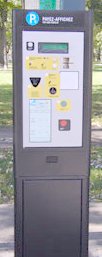 The meters run a 2.4.19 Linux kernel, and are networked wirelessly via GPRS (a kind of cell phone protocol). A low-powered ARM processor and a large reserve battery enable the stations to run on solar power, separate from both electrical and telephone grids.
The meters run a 2.4.19 Linux kernel, and are networked wirelessly via GPRS (a kind of cell phone protocol). A low-powered ARM processor and a large reserve battery enable the stations to run on solar power, separate from both electrical and telephone grids.
Customers can pay or add time using coins or credit cards from any payment station in the city, provided they remember the parking spot identification code marked on the panel in front of their parking spot. After paying, they need not return to their car with a receipt.
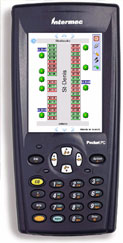 Meter maids can cruise for violators using ruggedized Intermec handheld devices inside their vehicles. The devices have built-in city maps on which paid spots are green and unpaid spots are red.
Meter maids can cruise for violators using ruggedized Intermec handheld devices inside their vehicles. The devices have built-in city maps on which paid spots are green and unpaid spots are red.
Centralized control enables city officials to adjust rates on the fly, for example raising the rates during sporting events, concerts, or other times of high parking demand.
What's inside the box?
8D began with a parking payment station developed by parking equipment manufacturer Cale in the 1980s, replacing the device's motherboard with 8D's “ECO” device for wireless point-of-sales (POS) systems.
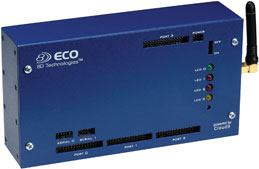
8D's “ECO” wireless POS device
Integrating its POS technology with the existing device proved to be one of the challenges for 8D. According to CTO Jean-Sébastien Bettez, “We are a software company. We had to acquire expertise in this new hardware environment, to work with the buttons on the keypad and the card reader. We had to make it work the same as before, so users find no difference from the old one.”
Bettez adds that 8D completed a prototype in four months, and finished the project in a year and a half.
8D's ECO wireless POS device incorporates three boards. An ADS BitsyPlus serves as the embedded computer. An Atmel 8-bit AVR risc-based microcontroller handles data acquisition tasks. A third, customizable interconnect board provides the necessary interface ports, including serial, IrDA, PCMCIA, digital I/O, analog I/O, wireless WAN (GPRS), Serial Programming Interface (SPI), and One Wire.
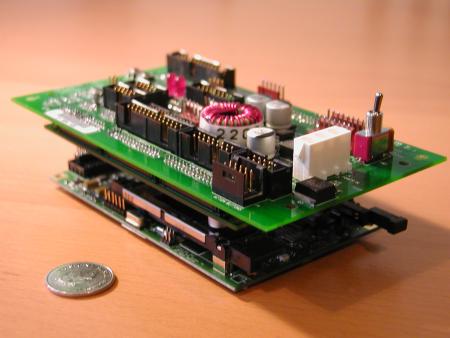
8D's “ECO” device comprises three interconnected boards. The Canadian quarter is optional.
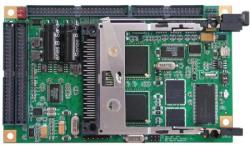
An ADS BitsyPlus serves as the embedded computer
(Click for larger view)
The BitsyPlus is based on a 206 MHz StrongARM SA-1110 processor, along with an SA-1111 companion chip. It incorporates power-partitioning technology that ADS claims yields the highest “MIPS/watt” (Millions of Instructions per watt) available. The board includes an interface for the CompactFlash device that the parking station boots from, along with 64MB of RAM.
Software side
The stations run a Linux distribution that 8D developed in-house. Bettez notes that “8D has been using and supporting Linux since [our] very beginning in 1996.”
The parking stations are based on a Linux kernel with the ARM patch applied, as well as a patch from BitsyPlus supplier ADS. Additionally, 8D developed several kernel modules for the parking stations, including one to support the aggressive power management scheme needed by the solar-powered design.
“Linux runs for 1.5 minutes, then goes to sleep,” explains Bettez. “When the kernel slept, it was changing a line in /proc that tells us if the network is there or not. This stopped the GPRS modem from answering. We discovered this problem on a Monday, and by Tuesday had developed a fix.”
Bettez says this example illustrates the power of Linux for embedded development. “In the server world, you don't want to mess with the kernel. In embedded, it's very useful, because you can tweak things for your own needs.”
Bettez also praises the willingness of the Linux community to help solve problems. “We talked to ADS, and they helped us. Linux people are very friendly people.”
8D also developed a kernel module to drive the BitsyPlus's Serial Programming Interface. “SPI provides a very fast way to transfer data between the BistyPlus and the data acquisition board,” notes Bettez.
8D's Linux implementation for the parking stations uses the ipkg package management system from the Familiar Linux distribution for iPaqs. It also draws from many popular open source projects including ntp, gcc, and pppd.
8D developed the parking stations' application software using Java, and the devices use a Java virtual machine from Sun. “Linux is very powerful, stable, open, and extremely flexible. It allows us to work with existing applications available on the market, such as Sun Java virtual machine,” notes Bettez.
Bettez says that before choosing Linux, 8D reviewed a number of embedded OSes, and found that Linux was uniquely positioned to support a wide range of hardware components. “The TCP/IP stack in Linux was also a big plus,” adds Bettez.
8D also looked at other hardware platforms, including the Motorola PowerPC architecture, before choosing ARM.
Linux does the job
Bettez expects embedded Linux to continue to thrive. “Even though it's not as publicized as it could be, we see more and more corporations turning to Linux. Because Linux is so powerful and stable, a lot of products are also using Linux – oftentimes without the world knowing. . . just like we did with our own products.”
Bettez calls Linux an “excellent” choice for sophisticated parking meters, because “clients want efficient and reliable products that meet their expectations — they don't really care what's inside. Developers can deliver what clients want using Linux.”
“This was our first big embedded Linux project,” adds Bettez. “We knew Linux was smart enough — with Linux you can do basically everything you want.”
CEO Isabelle Bettez notes that 8D is exploring opportunities to deploy the Linux-based parking stations in several other cities, “including one in Europe.” Isabelle Bettez notes that 8D is prepared to offer several features not included in the Montreal roll-out, including debit card payments, payment via secure Web page, and more.
This article was originally published on LinuxDevices.com and has been donated to the open source community by QuinStreet Inc. Please visit LinuxToday.com for up-to-date news and articles about Linux and open source.